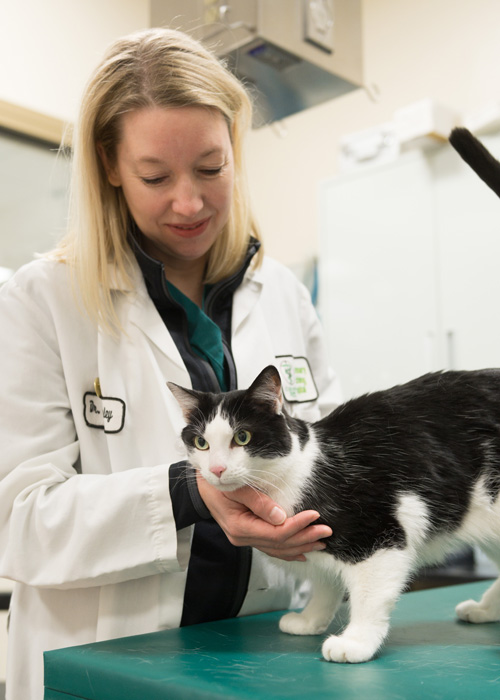
Deanna Worley, D.V.M., Diplomate ACVS-SA
ACVS Founding Fellow – Surgical Oncology
ACVS Founding Fellow – Oral and Maxillofacial Surgery, Small Animal
Professor, Surgical Oncology
Some life paths are crystal clear beacons, others become more evident over time, and other paths are stumbled upon. For me the path to veterinary surgical oncology combined all three. Circumstances in my life have not been accidental, and I am indebted to several mentors along the way, from a high school instructor who introduced the field of biomedical science to professors who encouraged asking critical questions, by another whose words still resonate–don’t be unafraid but brave–and to my beloved family. Growing up in Montana I had an intense love of animals and of people, but didn’t know how that would personally manifest, yet I had an innate knowledge that surgery was my future. I ultimately pursued a veterinary degree over a medical degree which was a very difficult choice.
I earned my bachelor’s degree in biomedical science and a distinction from the University Honors program at Montana State University. From there it was off to Colorado State University for my veterinary degree followed by an internship in Dallas. I was a general practitioner in Spokane, Washington for two years experiencing traditional practice. Still steadfast to a future in specialty surgery, I spent the next two years in a surgical internship at Gulf Coast Veterinary Specialists in Houston. After that experience, I matched to a small animal surgery residency program at the University of Pennsylvania and then went on to the surgical oncology fellowship at the Flint Animal Cancer Center, and was then offered a valued faculty position here. It makes me smile when people ask me where my accent is from.
Being at the Flint Animal Cancer Center is like coming full circle to me, particularly with constant opportunities to blend and impact animal health and research with human health. It’s like I never really had to choose between a future of human medicine or veterinary medicine. It is all relevant and translates bidirectionally, and is truly one medicine. We are keenly aware at the FACC that one in three dogs, one in four people, and one in five cats will experience a cancer diagnosis. I can attest that hearing a cancer diagnosis can be scary, and it is important to know not all cancer diagnoses are the same nor have the same implications. Progress continues to be made. Veterinary students who rotate on clinical service with us share their notions that an oncology rotation might be depressing or sad. And what they learn is competent optimism, that there are a gradient of choices available for care and how preserving a good quality of life is of utmost importance when caring for a family and their pet member.
I am intensely happy at the Flint Animal Cancer Center. My work joys include any opportunity to be in surgery, to share and train the art of surgical oncology, to engage with students and clients (I really cherish people), and to pursue research activities. My current research includes lymphatic metastasis and lymphatic-targeting chemotherapy and in lessening surgical trauma associated with cancer treatment while improving surgical success. Every day I am energized by the collegial environment and collaborations singularly possible at the FACC.